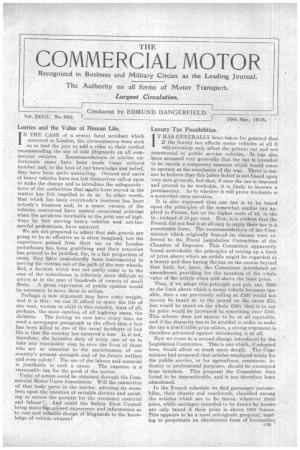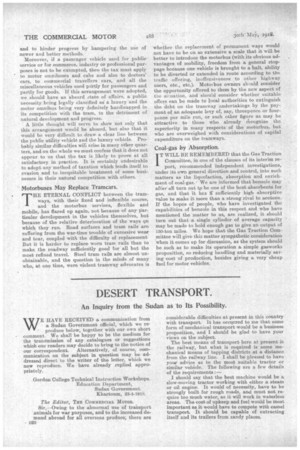Lorries and the Value of Human Life.
Page 1

Page 2

If you've noticed an error in this article please click here to report it so we can fix it.
IN THE CASE of a recent fatal accident which occurred in London, the circumstances were such as to lead the jury to add a rider to their verdict recommending the use of side lifeguards on all corame:icial vehicles. Recommendations in similar unfortunate cases have been made times withoet number and, to the best of our knowledge and belief, they have been quite unavailing. Owners and users of heavy vehicles have not felt themselves -called upon to make the change and to introduce the safeguards : none of the authorities that 1ght-have moved in the matter has felt impelled to do so. In other words, that which has been everybody's business has been nobody's business and, in a sense, owners of the vehicles ooncerned have earned occasional criticism when the accidents inevitable to the joint use of high_ ways by fast moving heavy vehicles and not-toocareful pedestrians, have occurred.
We are not prepared to admit that side guards are going to be so effective as is often imagined, but the experience gained from their use on the London motorbuses has been gratifying and their retention has proved to be justified, for, in a fair proportion of cases, they have undoubtedly been instrumental in moving the victims o.ut of the path of the rear wheels. But, a decision which was not eaaily came to in the case of the motorbuses is infinitely more difficultto arrive at in the case of hundreds of owners of small fleets. A great expression of public opinion would be necessary to move them to action.
Perhaps a new argument may have some weight, and it is this : we can ill afford to spare the life of any man, woman or child in this country, least of all, perhaps, the most careless of all highway users, the chiklren. The feeling we now have every time we read a newspaper paragraph to the effect that a boy has been killed in bne of the usual incidents of boy life is that the country has incurred a loss. is it not, therefore, the bounden duty of every one of us to take any reasonable step to save the lives of those who are so essential to the maintenance of our country's present strength and of its Juture welfare and even safety? The use of the labour and material is justifiable in such a cause. The expense is •a reasonable tax for the good of the nation.
Unity of action could be obtained through the Commercial Motor Users Association. Will the committee of that body move in the matter, advising its members upon the question of suitable devices and assisting to secure the pen/tits for the necessary material and labour ? . And could the Safety First Council bring motorbus-gained experience and information as to cost and suitable design of lifeguards to the knowledge of vehicle owners?
Luxury 'Tax Possibilities.
IT HAS GENERALLY beetataken for granted that if the luxury tax affects motor vehicles at all it willeertainly only affect the private car and not commercial or public service vehicles. It has also been assumed very generally that the tax is intended to be merely a temporary measure which would cease to operate at the conclusion of the war. There is reason to believe that this latter belief is not based upon very sure grounds, but that, if once the taxis imposed and proved to be workable, it is likely to become a permanency. As to whether it will prove woikable is a somewhat open question.
It is. also supposed that our tax is to be based upon the principles of the somewhat similar tax ap-. plied in France, but on the higher scale of 2d. in the is., instead of 10 per cent. Now, it is evident that the French did not find it at all easy to apply their tax in a practicable form. The recommendations of the Commission which originally framed its clauses were referred to the Fiscal Legislation Committee of the Chamber of Deputies. This Committee apparently found unworkable the principles of setting up a limit of price above which an article might be regarded as a luxury and then basing the tax on the excess beyond that limit, for, later, the Committee introduced an amendment providing for the taxation of the whole value of the article when sold above the limit price.
Thus, if we adopt this principle and put, say, £50 as the limit above which a motor vehicle becomes taxable, then a car previously selling at £260 would not merely be taxed 2s. in the pound on the extra £10, but would be taxed on the whole £260, that is to say its price would he increased to something over 2300. This scheme does not appear to-be at all equitable, and if the disparity has to be avoided in Order to make the tax a pracCcable proposition, a strong argument is therefore advanced against introducing it at all.
Now we come to a second change introduced by the Legislation Committee. This is one which, if adopted here, would affect us much more deeply. The Commission had proposed that articles employed solely for the public service, or for agriculture, commerce, industry or professional purposea, should be exempted from taxation. This proposal the Committee 'then found to be impracticable, and it has therefore been abandoned.
In the French schedule we find passenger automobiles, their chassis and coachwork, classified among the articles which are to be taxed, whatever their price, -while carriages intended to be drawn by horses are only taxed if their price is above 1000 francs. This appears to be amost retrograde proposal, tending to perpetuate an obsolescent form of locomotion c19
and to hinder progress by hampering the use of newer and better methods.
Moreover, if a passenger vehicle used for public service or for commerce, industry or professional pur-: poses is not to be exempted, then the tax must. apply to motor omnibuses and cabs and also to doctors' cars, to commercial travellers cars, and all the miscellaneous vehicles used p*tly for passengers and partly for goods. If this arrangement were adopted, we should have an absurd itate of affairs., a public necessity _being legally classified as' a luxury and the motor omnibus being very definitely handicapped in its competition with the tram, to the detriment of natural development and progress.
A little thought will serve to show not only that this arrangement would be absurd, but also that it would be very difficult to draw a clear line between the public utility vehicle and the luxury vehicle. Probably similar difficulties will arise in many other quarters, and on the whole we must confess that it does not appear to us that the tax is likely to prove at all satisfactory in practice. It is certainly undesirable to adopt any method of taxation which lends itself to evasion and to inequitable treatment of some businesses in their natural competition with others.
Motorbuses May Replace Tramcars.
THE ETERNAL CONFLICT between the tramways, with their fixed and inflexible course, and the motorbus services, flexible and mobile, has flared up again, not because of any Particular development in the vehicles themselves, but because of the relative deterioration of the ways qn which they run. Road surfaces and tram rails are suffering from the war-time trouble of excessive wear and tear, coupled with the difficulty of replacement But it is harder to replace worn tram rails than to make the roadway sufficiently good for all but the most refined travel. Steel tram rails are almost unobtainable, and the question in the minds of many who, at one time, were violent tramway advocates is whether the replacement of permanent ways would not have to be on so extensive a scale that it will be better to introduce the motorbus (with Its obvious advantages of mobility, freedom from a general stoppage because one vehicle is brought to a halt, ability to be diverted or extended in route according to the traffic offering, inoffensiveness •to other highway users, etc., etc.). Motoibus owners should consider the opportunity offered to them by the new aspect of the situation, and should consider whether suitable offers can be made to local authorities to extinguish the debt on the tramway undertakings by the payment of an adequate levy of, say, threepence or fourpence per mile run, or such other figure as may be attractive to those who already recognize the superiority in many respects of the motorbus, but who are overweighed with considerations of capital expenditure on the tramways.
Coal-gas by Absorption.
IT WILL BE REMEMBERED that the Gas Traction Committee, in one of the clauses of its interim report, recommended independent investigations, under its own general direction and control, into such matters as the liquefaction, absorption and enrichment of coaI-gas. • We are informed that benzoie may aft:er all turn out tp be one of the best absorbents for gas, and that it has f sufficiently high absorptive value to make it more than a strong rival to acetone. If the hopes of people, who have investigated the capabilities of benzole in this respect and who have mentioned the matter to us, are realized, it should turn out that a single cylinder of average capacity may be made to hold enough gas to give an output of 150-ton miles. We hope that the Gas Traction Committee will give this matter sympathetic consideration when it comes up for discussion, as the system should be such as to make its operation a simple gasworks proposition, so reducing handling and materially saving cost of production, besides giving a very cheap fuel for motor vehicles.






















